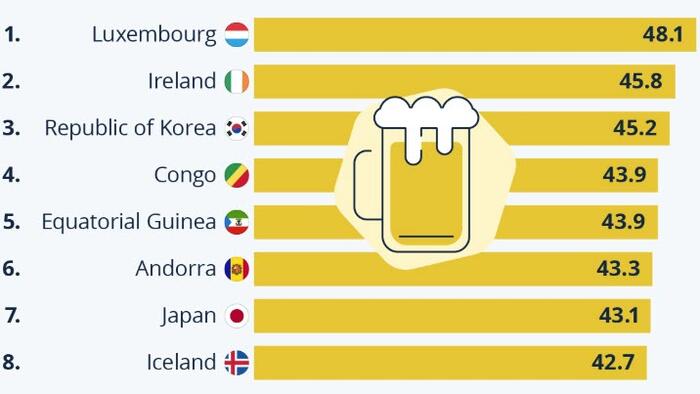According to recent data provided by Statista, a report highlights the drinking habits of various countries, focusing on binge-drinking patterns. The World Health Organization has identified Austria, Ireland, and Czechia as the countries with the highest rates of binge-drinking. Binge-drinking is defined for this data as the consumption of more than six units of alcohol or three pints of lager on a single occasion within the preceding 30 days. This definition underscores not just the quantity of alcohol consumed but also reflects a cultural approach to drinking that may be prevalent in these nations.
Austria, renowned for its rich culinary traditions and social gatherings, has high levels of alcohol consumption tied to its cultural practices, including beer festivals and wine events. The sociability associated with drinking in Austria can sometimes lead to excessive consumption. Similarly, Ireland’s drinking culture, famously linked to pub life and community gatherings, plays a significant role in its identity. Social cohesion and the emphasis on communal activities often translate into binge-drinking scenarios, especially during celebrations, holidays, or sporting events.
Czechia, known for its beer consumption per capita, also contributes significantly to binge-drinking statistics. With an established beer drinking heritage, the Czech populace is accustomed to consuming large quantities of alcohol, making it commonplace to engage in binge-drinking. The country consistently ranks highest in the world for beer consumption, thus influencing the overall patterns of alcohol use among its citizens. These cultural factors emphasize the intersection of tradition, social habits, and alcohol consumption in defining binge-drinking behaviors.
In contrast to these countries, others may demonstrate lower binge-drinking rates due to various social, economic, or cultural factors. Countries with more conservative social norms surrounding alcohol, or where alcohol consumption is strictly regulated, tend not to report the same levels of binge-drinking activity. This variation highlights the importance of understanding binge-drinking not only through numerical data but also through a nuanced awareness of cultural attitudes towards alcohol across different societies.
Public health initiatives have sought to address the issue of binge-drinking in these high-consumption countries. Governments and organizations advocate for responsible drinking guidelines and aim to raise awareness about the health risks associated with excessive alcohol consumption. Strategies may include educational campaigns, stricter regulations on alcohol sales, and community support programs aimed at curbing binge-drinking trends.
In summary, Austria, Ireland, and Czechia stand out as the leading countries for binge-drinking behaviors, according to the World Health Organization and data compiled by Statista. The cultural roots of alcohol consumption in these nations reveal a complex relationship between social practices and public health. Understanding these patterns and promoting responsible drinking can play a crucial role in mitigating the adverse effects of binge-drinking while preserving the rich social traditions that come with alcohol consumption in these countries.

